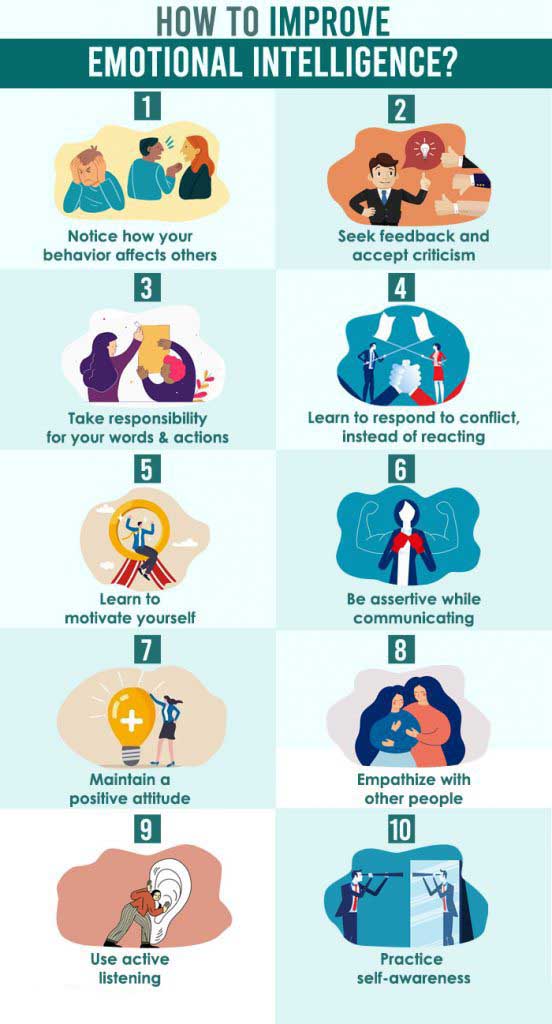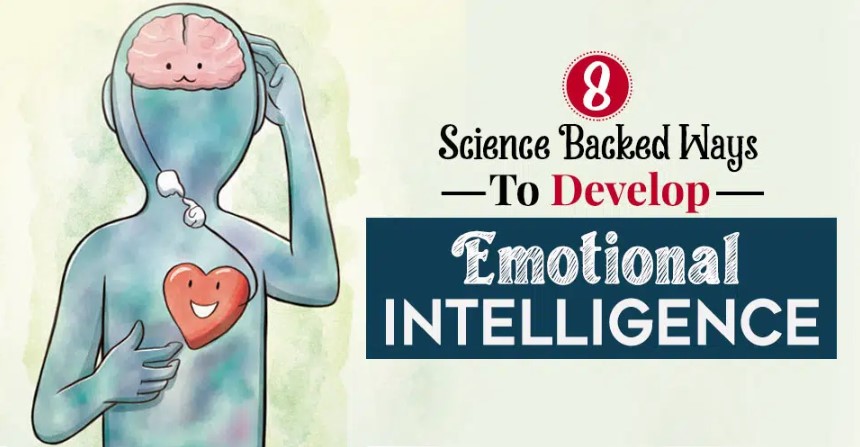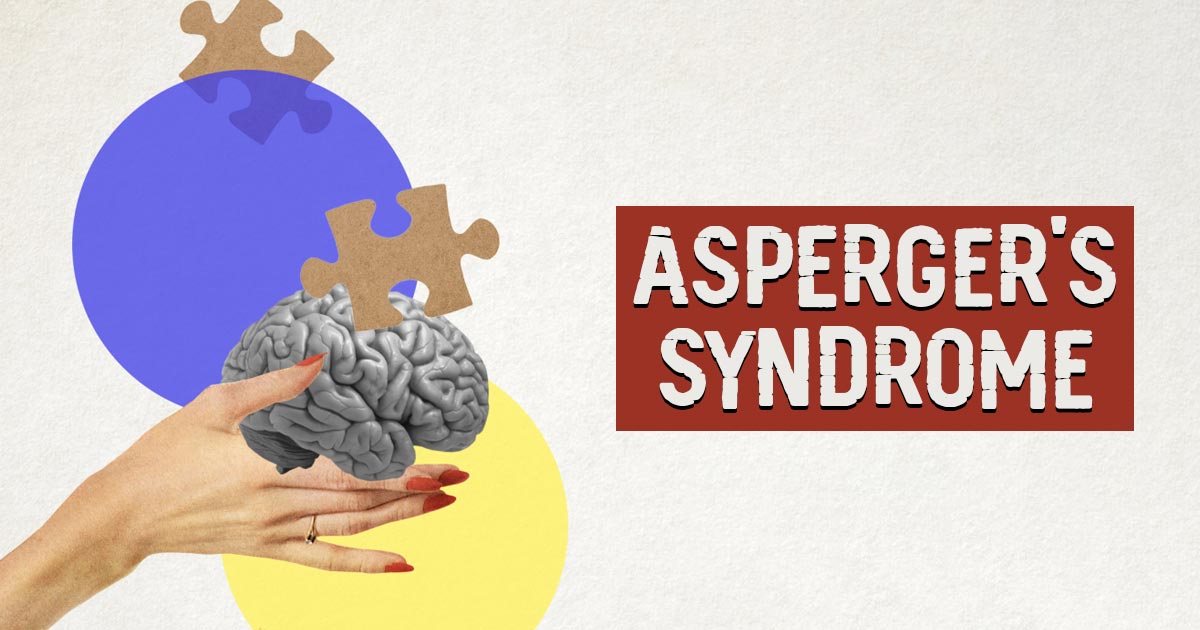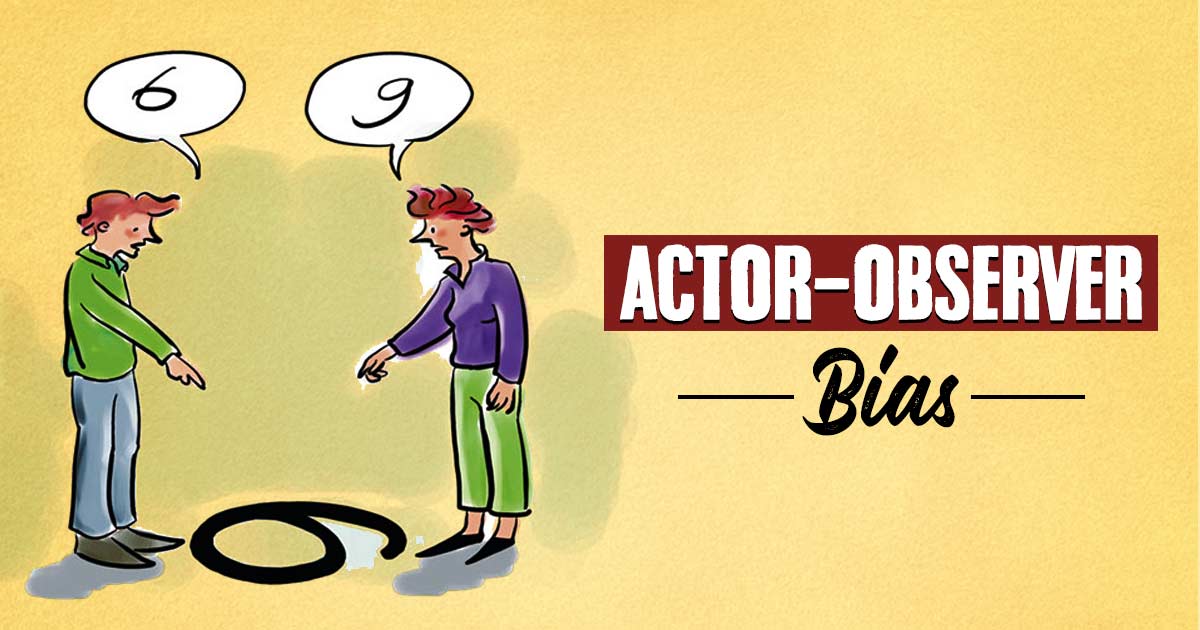Emotional intelligence (EI) or emotional quotient (EQ) is our ability to perceive, understand and manage emotions. Although it is an inborn trait, one can learn to develop high emotional intelligence.
Understanding EQ
Emotional intelligence is the ability to recognize and understand different emotions within self and others and realizing how our emotions may affect others. Mindstar Health explains EQ as “a form of intelligence which focuses on effectively processing emotional information. This information is utilized in decision making, reasoning and various other cognitive actions.”
Developed by psychologists Peter Salovey and John D. Mayer, emotional intelligence is a crucial trait that can help to improve our empathy 1Abe, K., Niwa, M., Fujisaki, K., & Suzuki, Y. (2018). Associations between emotional intelligence, empathy and personality in Japanese medical students. BMC medical education, 18(1), 47. https://doi.org/10.1186/s12909-018-1165-7 , self-awareness, academic or work performance 2 Wijekoon, C. N., Amaratunge, H., de Silva, Y., Senanayake, S., Jayawardane, P., & Senarath, U. (2017). Emotional intelligence and academic performance of medical undergraduates: a cross-sectional study in a selected university in Sri Lanka. BMC medical education, 17(1), 176. https://doi.org/10.1186/s12909-017-1018-9 , physical and mental health 3 Guerra-Bustamante, J., León-Del-Barco, B., Yuste-Tosina, R., López-Ramos, V. M., & Mendo-Lázaro, S. (2019). Emotional Intelligence and Psychological Well-Being in Adolescents. International journal of environmental research and public health, 16(10), 1720. https://doi.org/10.3390/ijerph16101720 , social intelligence and personal relationships 4 Schutte NS, Malouff JM, Bobik C, Coston TD, Greeson C, Jedlicka C, Rhodes E, Wendorf G. Emotional intelligence and interpersonal relations. J Soc Psychol. 2001 Aug;141(4):523-36. doi: 10.1080/00224540109600569. PMID: 11577850. .
A recent 2020 study 5 Sheikhbardsiri, H., Sheikhasadi, H., Mahani, S. A., & Mohamadi, M. (2020). Emotional intelligence and learning strategies of postgraduate students at Kerman University of Medical Sciences in the southeast of Iran. Journal of education and health promotion, 9, 66. https://doi.org/10.4103/jehp.jehp_544_19 explains “Emotional intelligence refers to the possession of self-knowledge skills and a person’s knowledge of their own identity, thoughts, emotions, feelings, and personal traits.” Research 6 Gilar-Corbi R, Pozo-Rico T, Sánchez B, Castejón JL. Can emotional intelligence be improved? A randomized experimental study of a business-oriented EI training program for senior managers. PLoS One. 2019 Oct 23;14(10):e0224254. doi: 10.1371/journal.pone.0224254. PMID: 31644585; PMCID: PMC6808549. shows that EQ can be learned through training even though it is typically considered as an inherent trait.
Read More About Emotional Intelligence Here.
How To Improve EQ?
Some individuals may not experience empathy naturally. However, by making some efforts, one can empathize with others and understand their mindset and responses. But one must be aware that learning and improving emotional intelligence and applying EQ in life are two very different things.
If someone is overwhelmed by anxiety and stress, they may not be able to control their own emotions even if they want to. This is why it is important that we must learn to cope with difficult situations, be emotionally aware and focus on building healthier relationships while improving our EI.
Here are a few important elements that we need to develop in order to learn high emotional intelligence:
A. Active listening
Active listening refers to the ability to listen with all your senses and concentration. It necessitates that you understand and respond to what is being said and remember it. Although it may be a bit challenging, it can be developed with practice and patience. By giving your undivided attention to the speaker and allowing them to speak without being interrupted, you will be able to gain a clear understanding of what the speaker is feeling or experiencing.
Hence, paying attention is perhaps the most important step. You should not only listen to what they are saying verbally, but also observe their non-verbal communication as facial expressions, body language and gestures can convey a lot of meaning. Once you understand how the speaker is actually feeling, try to analyze and comprehend the various factors that may influence their emotions.
B. Empathy
Empathy is a core element of EQ. It refers to your ability to understand others’ perspectives & feelings. It enables us to show compassion to people around us. Recognizing emotions is essential for building relationships. Empathizing with others enables us to put ourselves in someone else’s proverbial “shoes” and realize what they are thinking and feeling. Practicing empathy can enable us to build stronger emotional skills and understand the emotional significance of a certain situation.
Empathy is a core component of emotional intelligence as it equips us to better connect on a human level, without judgment or reactivity. A recent research 7 Numanee, I. Z., Zafar, N., Karim, A., & Ismail, S. (2020). Developing empathy among first-year university undergraduates through English language course: A phenomenological study. Heliyon, 6(6), e04021. https://doi.org/10.1016/j.heliyon.2020.e04021 claims that “empathy is a compulsory human trait” and should be considered as the essence of a person’s identity as a human being. The researchers state “Empathy is an indispensable human quality that shapes the interpersonal actions of human beings.” We can cultivate empathy by questioning our biases and beliefs, shifting our mindset and perspectives, being more curious and challenging ourselves.
Read More About Empathy Here.
C. Reflection
Mental reflection provides us the ability to reason with our own thoughts and emotions, which is a vital aspect of high emotional intelligence. Self-reflection refers to our ability to utilize introspection and understand more about ourselves. This is an important aspect of self-awareness and relies on different emotional and cognitive skills. Our ability to reflect affects how we conduct ourselves, make decisions and respond & interact with others.
As our emotions strongly affect our decisions, behaviors and actions, self-reflection allows us to assess emotions and influence others and their behavior as well. By trying to understand why someone is feeling or behaving in a particular way, we will be better able to understand the crucial role emotions play in our lives.
Ways To Develop High Emotional Intelligence

One can develop EQ with practice and patience. Here are some helpful ways that can help you in improving and building high emotional intelligence to gain a better understanding of yourself and others:
1. Identify your emotions
Notice what emotions you experience in a given moment. Recognize what type of emotions you feel in successful or stressful situations. Simply pause and reconsider your emotions and name the emotions you identify.
2. Observe your reactions
Recognize and inspect how you usually tend to respond to others. If you tend to judge others instantly and react accordingly without understanding or considering their emotions or the situation, then it indicates that you have low EQ. By honestly observing how you interact with people around you and empathizing with them, you will be able to accept their needs and perspectives more.
3. Understand the impact of your behavior
Knowing and analyzing exactly how your actions may influence or affect other people beforehand can help you become more considerate. By practicing empathy and putting yourself in their shoes, you can determine if your decision will have a positive or negative impact on someone. Once you know the answer, you can look for other ways you may act or behave that will be beneficial to everyone.
4. Practice personal accountability
Self-accountability shows that you feel responsible for your decisions and actions. Personal accountability helps to develop high emotional intelligence as you believe you can only bring change by changing and improving yourself. When you take responsibility for yourself, you realize that it is better to apologize for your mistakes than ignoring it. This gives you the opportunity to grow mentally and emotionally.
5. Analyze your reaction to stress
Observe how you react when experiencing a stressful situation. People with low EQ tend to become upset when things don’t go their way. They may feel anxious, worried or overwhelmed. They may even mistakenly put the blame on others to cope with the stress. However, if you want to improve your emotional quotient then you need to learn how to manage stress and control your difficult emotions. This will help you remain calm in stressful situations.
6. Seek feedback
Evaluate your self-perception by asking your friends, family members, mentors, coworkers and even managers to rate your emotional intelligence. Ask them to honestly tell you how empathic you are, how open you are to change and how calmly you can handle stress and conflict. Although you may not agree with most of their opinions and feedback, it will help you gain a better understanding of how others perceive your level of EQ and then you can work on yourself accordingly.
7. Respond, don’t react
Responding is very different from reacting. We react out of an emotional trigger and it is usually an unconscious process. Reactions allow us to express repressed emotions. However, when we respond to someone, we make a conscious effort to notice how we are feeling and determine how we need to behave in that particular situation. Moreover, when we respond, we try to understand what the other person is experiencing and respond accordingly without judging them.
8. Be mindful
Mindfulness refers to the ability of being fully present without judging or reacting to internal or external stimuli. It is the practice of purposely being aware and focusing our attention on the present moment. Mindfulness is an integral part of self-awareness and helps to shift our mindset to the present instead of focusing on our preoccupation.
One 2018 study 8 Rodríguez-Ledo, C., Orejudo, S., Cardoso, M. J., Balaguer, Á., & Zarza-Alzugaray, J. (2018). Emotional Intelligence and Mindfulness: Relation and Enhancement in the Classroom With Adolescents. Frontiers in psychology, 9, 2162. https://doi.org/10.3389/fpsyg.2018.02162 found that mindfulness and high emotional intelligence are closely associated. The researchers state that “Showing a good mindfulness competence was particularly related to having a good general level of the EQ trait.” Mindfulness allows you to be aware of your mental, emotional and physical sensations and help you become more self-aware and emotionally intelligent.
What To Avoid?
However, you also need to avoid certain thought and behavior patterns when trying to improve your emotional intelligence, such as:
- Negativity
- Selfishness
- Drama
- Being vindictive or vengeful
- Tendency to nag and complain
- Thinking about the past
- Submitting to peer pressure
- Being judgmental or overly critical
- Being controlling or dominating
Accomplish Goals With EQ
Learning to develop EI is a lifelong process. Following the above mentioned steps can help you to develop high emotional intelligence, whether you were born with EQ or not. With practice, perseverance and patience you can build the right attitude and perspective that will make you more self-aware and empathic. When you can recognize emotions in yourself and others and apply emotional intelligence effectively you will be able to achieve your goals and reach your full potential.










